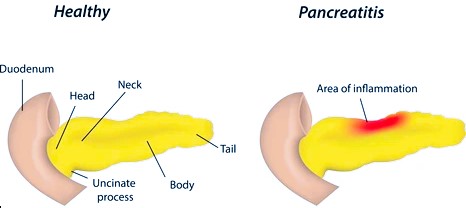Chronic Pancreatitis: Causes, Symptoms, and Treatment
Learn about chronic pancreatitis, including its causes, symptoms, and treatment options. Discover ways to manage and improve your pancreatic health. #Pancreatitis


Introduction
Chronic pancreatitis is a long-term inflammation of the pancreas, a gland located behind the stomach. This condition can lead to permanent damage to the pancreas, impairing its ability to produce digestive enzymes and hormones. In this article, we will explore the causes, symptoms, and treatment options for chronic pancreatitis.
Causes of Chronic Pancreatitis
Chronic pancreatitis can be caused by various factors, including:
Excessive alcohol consumption: Heavy and prolonged alcohol use is one of the leading causes of chronic pancreatitis.
Smoking: Cigarette smoking has been linked to an increased risk of developing chronic pancreatitis.
Genetic factors: Certain genetic mutations can make individuals more susceptible to developing chronic pancreatitis.
Autoimmune conditions: In some cases, the body's immune system mistakenly attacks the pancreas, leading to chronic inflammation.
Obstruction of the pancreatic duct: Blockages in the pancreatic duct can cause the digestive enzymes to back up and damage the pancreas.
Symptoms of Chronic Pancreatitis
The symptoms of chronic pancreatitis can vary from person to person, but common signs and symptoms include:
Abdominal pain: Persistent pain in the upper abdomen that may radiate to the back.
Indigestion: Difficulty digesting food, leading to bloating, gas, and diarrhea.
Nausea and vomiting: Feeling sick to the stomach and experiencing episodes of vomiting.
Unexplained weight loss: Gradual and unintended weight loss despite a normal or increased appetite.
Fatty stools: Pale, greasy, and foul-smelling stools due to poor digestion and absorption of fats.
Treatment Options for Chronic Pancreatitis
While there is no cure for chronic pancreatitis, treatment aims to manage symptoms, prevent complications, and improve quality of life. The treatment options may include:
Lifestyle changes: Quitting alcohol and smoking, adopting a healthy diet, and managing pain with over-the-counter or prescription medications.
Enzyme replacement therapy: Taking pancreatic enzyme supplements to aid digestion and improve nutrient absorption.
Pain management: Using pain medications, nerve blocks, or surgical interventions to alleviate chronic abdominal pain.
Endoscopic interventions: Procedures such as endoscopic retrograde cholangiopancreatography (ERCP) can be performed to remove blockages in the pancreatic duct.
Surgery: In severe cases, surgical interventions may be necessary to remove damaged parts of the pancreas or to relieve obstructions.
Conclusion
Chronic pancreatitis is a complex condition that requires careful management and treatment. It is important to identify the underlying causes, address symptoms, and make necessary lifestyle changes to prevent further damage to the pancreas. If you suspect you may have chronic pancreatitis, it is crucial to consult with a healthcare professional for an accurate diagnosis and appropriate treatment plan.
